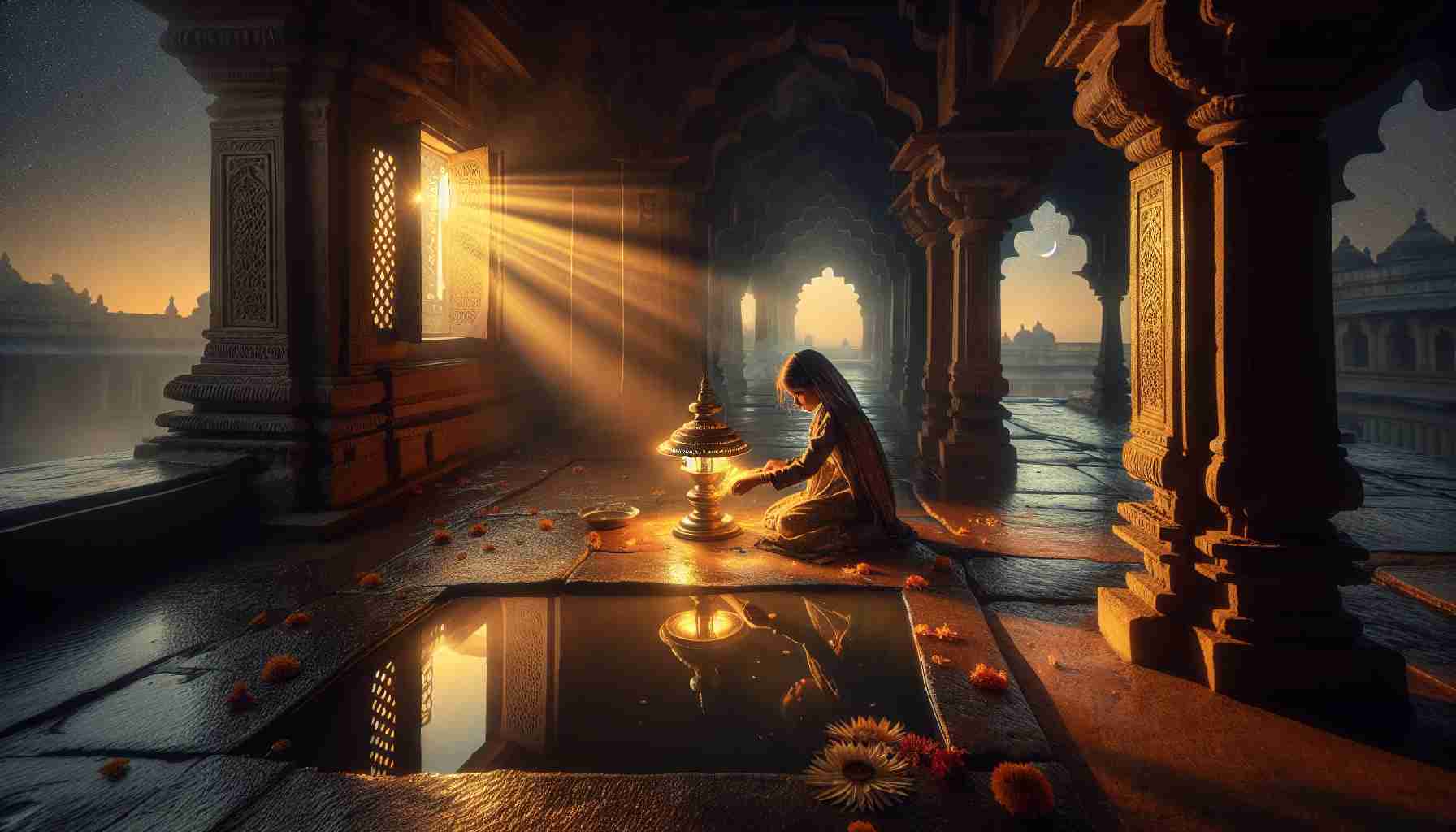

I was the temple sweeper’s daughter.
Our small home clung to the edge of the ashram grounds in Tamil Nadu, close enough to hear the conch at dawn but far enough away that most people forgot we lived there. My father never minded. “To serve, unseen, is the closest we come to true seva,” he would say with a smile as he polished the brass lamps or gathered flower petals for the altar.
But I wasn’t so content.
At twelve, I watched others my age given roles in temple dance or study. I, covered in powder from sweeping the stone floors, felt like a shadow moving across the sacred.
One evening, as bhajans (devotional songs) echoed from the inner sanctum, I stood just outside, cradling a broken clay diya in my hands. I'd accidentally dropped it while cleaning near the dhuni fire. I was sure I would be scolded.
Instead, no one noticed me at all.
It was then the ache hit me—the kind that presses against your chest when you wonder if you’re invisible not just to people, but to God.
I sat by the edge of the temple pond, quiet. My bare feet dangled into the water. The moon reflected in the silvery ripples, and I stared at it for a long time.
A verse bubbled up from memory—something I'd heard my mother chant while folding our clothes:
"He sees all beings as Himself and Himself in all beings. Seeing the same God everywhere, he does not hurt himself or others.” (Bhagavad Gita 6.29)
I’d never thought much of the Gita before. But that night, it didn’t feel like a high teaching for sages. It felt like Amma had passed me a secret note, reminding me that even here, even in silence and shadows, the Divine saw me.
Not because I lit the lamps or recited perfect prayers. But because I am.
A little fish darted near my toes, then disappeared into the lily roots. Just then, a breeze swept over the pond, carrying the scent of jasmine from the altar. I closed my eyes. I could almost feel the gaze of the Lord—not like eyes watching, but like warm firelight brushing your back.
In the Upanishads, it’s said: “He who dwells in all…who sees unseen…He is the Self within.” (Brihadaranyaka Upanishad 3.7.23) That night, I truly believed it.
Later, I quietly replaced the broken diya pieces in the clay pile and returned to sweep. No one praised me. No one even looked my way.
But I didn’t need them to anymore.
Like Hanuman—devoted servant of Rama—who never sought the spotlight but always served with full heart, I, too, could love from the quiet edges. (Ramayana)
And love, I realized, is never unseen.
Not by the One who dwells within all things. Not by the One who breathed this soul into form.
Not ever.
I was the temple sweeper’s daughter.
Our small home clung to the edge of the ashram grounds in Tamil Nadu, close enough to hear the conch at dawn but far enough away that most people forgot we lived there. My father never minded. “To serve, unseen, is the closest we come to true seva,” he would say with a smile as he polished the brass lamps or gathered flower petals for the altar.
But I wasn’t so content.
At twelve, I watched others my age given roles in temple dance or study. I, covered in powder from sweeping the stone floors, felt like a shadow moving across the sacred.
One evening, as bhajans (devotional songs) echoed from the inner sanctum, I stood just outside, cradling a broken clay diya in my hands. I'd accidentally dropped it while cleaning near the dhuni fire. I was sure I would be scolded.
Instead, no one noticed me at all.
It was then the ache hit me—the kind that presses against your chest when you wonder if you’re invisible not just to people, but to God.
I sat by the edge of the temple pond, quiet. My bare feet dangled into the water. The moon reflected in the silvery ripples, and I stared at it for a long time.
A verse bubbled up from memory—something I'd heard my mother chant while folding our clothes:
"He sees all beings as Himself and Himself in all beings. Seeing the same God everywhere, he does not hurt himself or others.” (Bhagavad Gita 6.29)
I’d never thought much of the Gita before. But that night, it didn’t feel like a high teaching for sages. It felt like Amma had passed me a secret note, reminding me that even here, even in silence and shadows, the Divine saw me.
Not because I lit the lamps or recited perfect prayers. But because I am.
A little fish darted near my toes, then disappeared into the lily roots. Just then, a breeze swept over the pond, carrying the scent of jasmine from the altar. I closed my eyes. I could almost feel the gaze of the Lord—not like eyes watching, but like warm firelight brushing your back.
In the Upanishads, it’s said: “He who dwells in all…who sees unseen…He is the Self within.” (Brihadaranyaka Upanishad 3.7.23) That night, I truly believed it.
Later, I quietly replaced the broken diya pieces in the clay pile and returned to sweep. No one praised me. No one even looked my way.
But I didn’t need them to anymore.
Like Hanuman—devoted servant of Rama—who never sought the spotlight but always served with full heart, I, too, could love from the quiet edges. (Ramayana)
And love, I realized, is never unseen.
Not by the One who dwells within all things. Not by the One who breathed this soul into form.
Not ever.